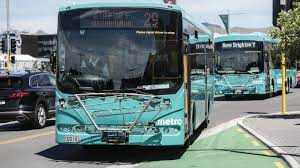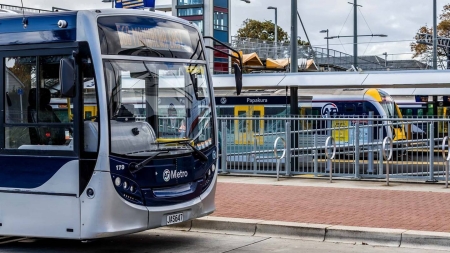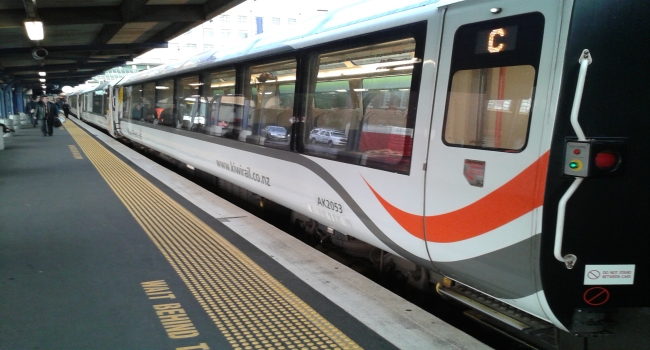Opinion - Anyone trying to catch a bus in Christchurch in the last year or so would have been frustrated by the frequent cancellations of trips, which can strike apparently randomly, but is certainly felt quite often on the Orbiter service. This comes in addition to a reduced timetable, with many trips removed.
These cuts were apparently necessary from December 2021 due to staff shortages, particularly a shortage of bus drivers, including more absence due to sickness. Other areas in New Zealand were even more affected than Christchurch, making public transport throughout the country unreliable.
In the year from 6 December 2021 in Christchurch 21,548 trips were missed and 21,929 trips were removed from the schedule. In a 12-month period normally 553,494 trips would have been run in Greater Christchurch. The reduced trips therefore only represented about 8% of trips, but the effect on the convenience and reliability on bus services has been signficant. I personally was late several times and put off going by bus. I also tried to help out several people stranded at bus stops, by trying to give them up-to-date information with the help of my phone. Without doubt this lack of reliability further decreased patronage.
Under the contractual provisions operators would be penalised $300 for every missed trip. Therefore under normal circumstances operators would be liable for $6,464,400 (only missed trips) to $13,043,100 (missed and deleted trips). These penalties are significant and could have considerably offset Ecan’s public transport expenditure. They would also have hit the operators hard.
Ecan decided that penalising operators the contractual amount could result in an unsustainable business for them and would risk contract termination and the inability to deliver bus services in Christchurch. To ensure service continuity the contractual amount was not charged. Instead, Ecan has agreed with the operators that normal payments will be reduced by the equivalent of the per km costs and per hour driver costs of any missed trips. A calculated set figure per trip is used, based on an average trip. A similar approach has been used by other Public Transport Authorities around the country. Ecan has not provided the set figure per trip, because this is considered commercially sensitive. However, it is likely to be significantly less than the penal rate for missed trips. This approach was used so that operators would not profit from missed trips, while allowing most services to continue.
Criticism
While I think that service continuity is important and it is understandable that the Councils should choose this approach, it represents a failure of the Public Transport Operating Model. Under that model, operators bid for contracts let by the Regional Council. Normally, the operator with the lowest offer wins the contract. Since there are quite strict requirements for timetabling and vehicles, staffing is one of the main ways to lower costs.
When such tendering of services was first introduced in the 1990s, there were dominant council-owned bus operators in most cities and towns, together with local branches of Cityline – the urban bus service of New Zealand Railways, and some smaller, private operators mainly providing school buses. In addition, new bus operators entered the market. Most of the many council-owned operators were sold to private companies.
A time of intense competition began, which did not really bring any benefits for passengers, but possibly saved regional councils a few thousand Dollars over a few years. Soon all these smaller bus companies around New Zealand consolidated. Now there are just six urban bus operators across New Zealand. And these are owned by just four, mainly overseas companies. Go Bus and New Zealand Bus are owned by Kinetic, an Australian bus company. The two companies hold at least 2/3 of contracts by value from regional councils in New Zealand. Ritchies, a private company that has grown rapidly through using questionable employment relations and buying up many smaller companies, has been bought by American investement firm Kohlberg Kravis Roberts. Howick & Eastern Buses and Mana Coachlines are both owned by French transport operator Transdev. And then there is Tranzit Group, a private company from the Wairarapa that has slowly won several contracts. This is the four-some oligopoly, which controls the bus market throughout New Zealand.
In Christchurch, Go Bus has won many contracts in recent years, mainly against Red Bus, the council-owned company that for some reason had not been sold in the general sell-off in the 1990s. Because Red Bus now had relatively few contracts, its earnings and values decreased and the directors of Christchurch City Holdings decided to sell it to Ritchies. Most of the cancellations and reductions for Christchurch Buses have happened and continue to happen on routes operated by Go Bus, not routes operated by Red Bus / Ritchies. This is possibly to due to greater union influence in the established Red Bus company and better conditions, which so far Ritchies seems to have carried over (in contrast to their earlier way of doing things). With hindsight we can now see that at the time of tendering Go Bus did not submit sustainable bids. Now that conditions have changed, Go Bus is not held to account.
The Public Transport Operating Model resulted in the decrease of value of a local-government-owned company and the sale of that company to an oligopoly member. Ecan then decided that these oligopology members were too big to fail and gave them special treatment, particularly the company that undercut Red Bus, a council-controlled company. Ecan, in fact, is financing the loss of value to Christchurch City Council. The short-sightedness of the directors of Christchurch City Holdings contributed to this transfer of assets from the public to the private sector. At the very least this is privatisation of profits and socialisation of losses.
Maybe ensuring continuity of service was the only reasonable option for Ecan. However, the current bus driver shortage should have been used as an opportunity by central and local governments to break up the oligopoly. Certainly the four large bus operators do not deserve any sympathy. In my experience from following European public transport procurement closely, best results are normally achieved by public transport being operated by local, mid-sized companies that are anchored in the region they operate in. Preferably, these companies have both government and private shareholding and aim for long-term sustainability rather than short-term profit or expansion. Patronage growth and better services need to be part of that long-term sustainability.
One way of ensuring more local companies and less concentration in a few companies is by moving away from tendering for all contracts. Rather, some local operators should be given a licence to operate in a certain area and be under contract on a cost-recovery basis that is benchmarked with other operations. This relative security in one area then allows operators to bid competitively for other contracts. Operators would not expect to be part of an oligopoly and push other companies out, but would be truly competitive for these services, allowing them to increase revenue.
The current problems need to be a catalyst for change in the public transport operator landscape and contracting model. At the moment the public is taken for a ride financially, but it is more difficult to ride on actual buses.
Tim Frank is a public transport advocate based in Christchurch
This opinion on publictransportforum.nz has permission of the writer.
Originally published in Talking Transport on 31 January 2023



